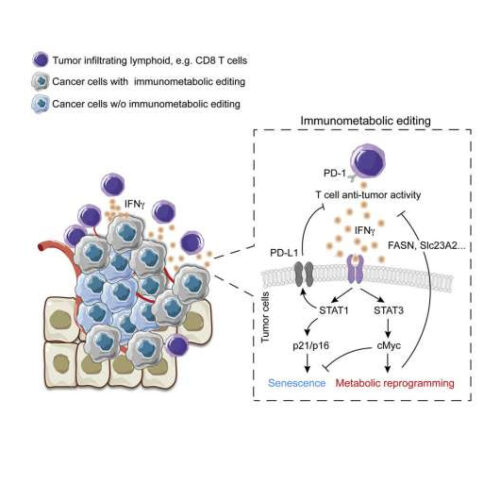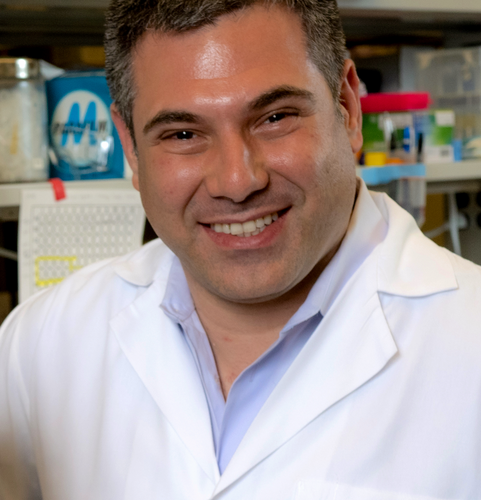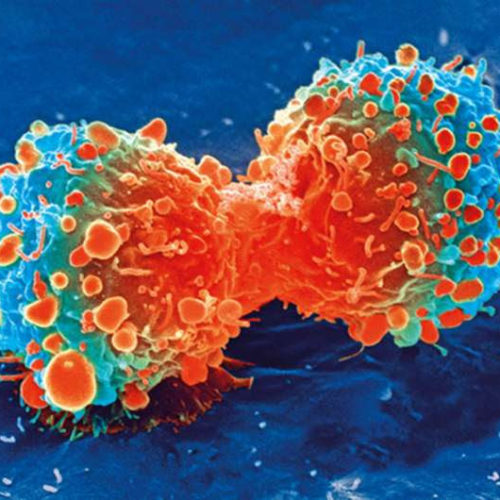by National Institutes of Health Bone scans of a patient before (left) and after (right) a six-month denosumab treatment show reduced turnover within fibrous dysplasia lesions (dark-colored patches). Credit: Alison Boyce, NIDCR A clinical trial at the National Institutes of Health found that a medication, denosumab, significantly reduced abnormal bone turnover in adults with fibrous...
Tag: <span>Therapy</span>
Researchers uncover novel aspect of tumor evolution and potential targets for therapy
by Ludwig Institute for Cancer Research Graphical abstract. Credit: Cell Metabolism (2023). DOI: 10.1016/j.cmet.2022.12.003 A Ludwig Cancer Research study has discovered that the immune system’s surveillance of cancer can itself induce metabolic adaptations in the cells of early-stage tumors that simultaneously promote their growth and equip them to suppress lethal immune responses. Led by Ludwig Lausanne Associate Member Ping-Chih...
HIV ‘drug factory’ implant promises once-a-year therapy
RICE UNIVERSITY IMAGE: THE LAB OF RICE UNIVERSITY BIOENGINEER OMID VEISEH IS DEVELOPING ENCAPSULATED CELLULAR “DRUG FACTORIES” TO TREAT PATIENTS WITH HIV THROUGH A ONCE-A-YEAR IMPLANT. CREDIT: JEFF FITLOW/RICE UNIVERSITY HOUSTON – (Dec. 5, 2022) – A Rice University laboratory, with a boost from the Bill & Melinda Gates Foundation,will develop a once-a-year treatment for patients...
A new hope for a therapy against retinitis pigmentosa
UNIVERSITÉ DE GENÈVE Retinitis pigmentosa, a degenerative genetic disease of the eye, is characterized by progressive vision loss, usually leading to blindness. In some patients, structural defects in the photoreceptor cells have been observed, but the molecular mechanisms involved are not understood. A team from the University of Geneva (UNIGE), in collaboration with the University...
Virtual reality could help make therapy easier
by Edith Cowan University Figure 1. The virtual space used in the present study from (A) a bird’s eye perspective, and (B) the perspective of the participant. Credit: DOI: 10.3389/frvir.2021.750729 If you find opening up to a therapist too daunting, new research shows you’re not alone—and you might soon have a new option. The Edith...
Therapy for most common cause of cystic fibrosis safe and effective in 6-11 y,o.
ANN & ROBERT H. LURIE CHILDREN’S HOSPITAL OF CHICAGO An international, open-label Phase 3 study, co-led by Susanna McColley, MD, from Ann & Robert H. Lurie Children’s Hospital of Chicago, found that a regimen of three drugs (elexacaftor/tezacaftor/ivacaftor) that targets the genetic cause of cystic fibrosis was safe and effective in 6-11-year-olds with at least...
Therapy Sneaks into Hard Layer of Pancreatic Cancer Tumor and Destroys it From Within
Every 12 minutes, someone in the United States dies of pancreatic cancer, which is often diagnosed late, spreads rapidly and has a five-year survival rate at approximately 10 percent. Treatment may involve radiation, surgery and chemotherapy, though often the cancer becomes resistant to drugs. Researchers at University of California San Diego School of Medicine and Moores...
Therapy sneaks into hard layer of pancreatic cancer tumor and destroys it from within
by University of California – San Diego Cancer cell during cell division. Credit: National Institutes of Health Every 12 minutes, someone in the United States dies of pancreatic cancer, which is often diagnosed late, spreads rapidly and has a five-year survival rate at approximately 10 percent. Treatment may involve radiation, surgery and chemotherapy, though often the...
SGLT2 inhibitors can slow progression of chronic kidney disease
Two randomized controlled studies [1, 2] show: SGLT2 inhibitors can slow CKD progression in all patients, not only in patients with diabetes 850 million people worldwide are affected by chronic kidney disease (CKD) – a worrying figure, and one that continues to rise. Treatment options for patients with CKD are multiple and often determined by...
Gene therapy for inherited blindness
by Ludwig Maximilian University of Munich Retinitis pigmentosa is the most prevalent form of congenital blindness. Using a retinitis pigmentosa mouse model, LMU researchers have now shown that targeted activation of genes of similar function can compensate for the primary defect. As many as 40,000 people in Germany suffer from retinitis pigmentosa. This hereditary disorder...






